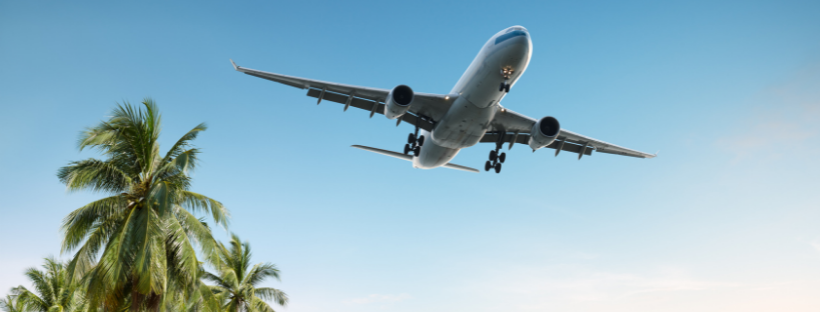
Written by Susan Lovelle | Premiere Wellness | KNOW Raleigh
In the next few minutes, you’re going to learn how you can thrive while you’re on the road – and without starving yourself or doing burpees, because burpees, right?
Before we get started, though, here’s everyone’s favorite—a pop quiz: According to Forbes, what are 44% of business travelers more likely to do? A. Eat more junk; B. Exercise less; or C. Sleep Poorly
If you guessed A, you’re right! But if you chose the other two (or all of them!), you’re not exactly wrong, either. These are all common issues that many seasoned travelers struggle with.
What this all boils down to is that traveling is hard. I found this out when I was dancing professionally many years ago. We were on the road nine months out of the year, yet we always had to be at peak performance. The last city on the road was expecting the same great show as the first. And it’s the same with you. You can’t afford to feel sluggish or not at your best when an important presentation is on the line.
But you can thrive while you’re on the road. You’re about to learn how to:
- Find healthier foods while on the road
- Choose healthier foods without feeling deprived or “different”
- Get better sleep
- Stay energized and focused without needing stimulants
- Eliminate “travel bloat” and other digestive issues
Although this could be quite complicated, it’s as simple as Listen, Let Go, and Live.
Listen To your Body
You’re a smart, busy woman on the road just like Sharon. Sharon is the Dean of Admissions for her college and came to us while she was planning a once-in-a-lifetime vacation to Antartica. She said, “Dr. Susan, every time I travel for work, I gain five pounds. I don’t want to do that, but I also want to enjoy myself. What do I do?” We shared with her the following recommendations and guess what? She came back energized, refreshed, and had actually lost a few pounds without trying!
Eat Whole Foods
I’m not talking about the national grocery chain. I’m talking about eating foods as close to their original form as possible, foods that you actually recognize because they haven’t been processed or significantly altered. When you do this, you automatically decrease inflammation in the body which is so important for energy and focus.
Have Protein for Breakfast
Next is eating protein in the morning rather than the sugary continental breakfasts with the shrink-wrapped blueberry muffins offered by so many hotels. Eggs and other lean proteins are good sources; add some veggies and healthy fats like avocado and you’re set for the day. Nut butters and seeds work well for those who are vegetarian or vegan. If the big vat of hot cereal is calling you, up the ante with more protein and fiber via added fresh or dried fruits, nuts, and seeds. And avoid the ubiquitous bowl of brown sugar that’s sitting next to them.
Carry Healthy Snacks
Always carry snacks. If driving, you’re golden—just pack whatever you’ll need and have them in the front seat with you. You’ll appreciate not having to stop at questionable gas stations along the way when you start getting hungry.
If flying, take at least enough for the trip so you can happily avoid the “delicious and nutritious” free peanuts and crackers the airlines generously give their passengers now. Great options include trail mix (with fruits, nuts, and seeds only—no M&Ms or other candy thrown in), jerky (check for preservatives), plantain or other grain-free chips, and boiled eggs.
Stock Groceries
Once you’re there, if your hotel doesn’t have an accommodating restaurant, make a quick trip to the nearest Whole Foods or other healthy grocery store for some fresh fruit and wholesome chips or crackers. I love plantain chips or almond crackers and snacks by Simple Mills — try them if you haven’t.
Eat Cooked Vs Raw Veggies
I’ve noticed that when women travel, they often have salads because they’re attempting to keep a tight rein on calories (a practice I typically advise you to steer clear from — go for quality, not quantity). The problem with this is that the added fiber plus the baseline dehydration of travel not infrequently leads to slowed digestion and even constipation, aka, “travel bloat.” Go with cooked veggies instead. Again, if your hotel can’t do it, look for local vegetarian-friendly restaurants with a variety of vegetable choices.
Hydrate!
Water, water, water. We know it’s important, but we tend to forget to keep drinking water, especially when flying. Airplane cabins dehydrate you as does the heavy air conditioning that seems omnipresent in hotels. With that dehydration comes slowed digestion, an increased appetite, and often, that pesky brain fog that keeps you from being your best.
Hydration, on the other hand, helps you detoxify, improves your digestion, and increases your brain function.
An easy solution is to carry a travel mug to the airport, empty except for an herbal tea bag and/or lemon slice, and then fill it with hot or cold water once through the TSA checkpoint. Keep your mug filled throughout the trip and later during meetings and drink your choice of healthy beverages vs the hotel coffee that is the usual fare.
Let Go of What’s Not Serving You
Ever hold on with a death grip to something that isn’t working because it’s all you know?
Einstein had it right: Insanity is doing the same thing over and over and expecting different results. What’s worse is when we keep doing the same thing even though the results are actually getting worse. It doesn’t matter whether it’s the food we’re eating, our relationships, or our work.
I get it. The idea of, say, stopping a medication that helps you sleep at night or function during the day can be downright scary. But you deserve better than just surviving.
The answer is to just let go of whatever isn’t serving you right now, at this point in your life. And know that what you get in return is often light years better than what you had, as Danielle found.
Danielle was what we called a “Cereal Girl” – never met a grain she didn’t like—bread, pasta, rice, and more. Her problem was that when she traveled, she got “clogged” up which was bad enough on its own, but also made her less than focused during meetings.
Cheeseburgers, fries, and soda was the typical meal Danielle ate while on the road because it was fast and always available. When she “let go” of these meals and began substituting them with our earlier food suggestions, her digestion and energy improved dramatically and she remained sharp throughout the entire day.
Holding on to what’s “worked” in the past can have a disastrous effect on your energy and your performance. It’s important to be willing to let go of what isn’t serving you so you can thrive.
In Part 2, you’ll learn how to begin living your own version of thrive while on the road. You’ll know how to get a great night’s sleep on the road, combat jet lag quickly, and stay energized throughout the day, even when the meeting is seriously boring 😉
We’re here to help you when you’d like to connect with us about designing your own blueprint to thriving on the road (or off!) schedule a complimentary Thrive Breakthrough Call here.

ABOUT THE AUTHOR
Susan Lovelle
Dr. Susan Lovelle, The Thrive Architect, supports business and professional women to thrive by holistically mastering their energy, weight, and hormones.
She’s the creator of Premiere Wellness, a comprehensive holistic health company in Raleigh, NC, serving clients globally.
Dr. Susan has been featured on The Doctors, Lifetime TV, The Huffington Post, Forbes, Good Morning Washington, and Good Day Charlotte.



